A throng of pro-China demonstrators gathered outside the Ministry of the Interior yesterday to demand that the government designate Retrocession Day as a national holiday.
Retrocession Day celebrates the end of the Japanese colonial period in Taiwan on Oct. 25, 1945, as well as the conclusion of the Sino-Japanese War (1937-1945), and is observed by Chinese worldwide.
"We need to remind the government of the importance of Retrocession Day -- of the more than 30 million Chinese who died at the hands of the Japanese military in China, and of the many who suffered under Japanese colonial rule here in Taiwan," said Tang Shu (
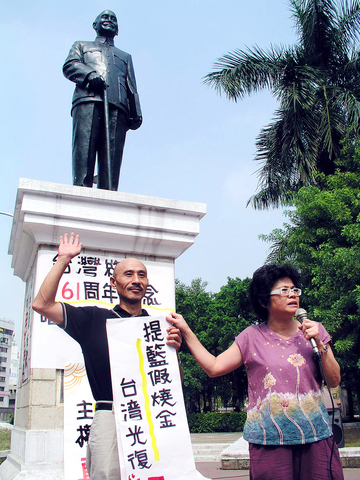
PHOTO: YU HSUEH-LAN, TAIPEI TIMES
Retrocession Day used to be a national holiday, but has not been observed since 2001 as the government has instead pushed for two-day weekends.
Luo Su-chuan (
Maggie Cheng (
"But we're not associated with the current anti-President Chen Shui-bian [陳水扁] campaign," Cheng added, despite the fact that numerous protesters wore "Depose Chen" baseball caps.
Shu, meanwhile, denounced Chen for not enshrining a holiday that was important to ethnic Chinese, adding that the US was pitting the Taiwanese and Chinese against each other to maintain its own hegemonic interests and a lucrative trade in weapons to Taiwan.
"The Americans don't like symbols of cross-strait unification such as Retrocession Day because they need to promote cross-strait enmity in order to sell their weapons," Tang said.
Tang added that although China has deployed more than 800 ballistic missiles on the east coast, "very few of the missiles actually target Taiwan."
Although the US was frustrated with a long-stalled arms package in the Legislative Yuan, US arms dealers were scrambling to sell other weapons to the country, Tang said.
Meanwhile, on a related issue, the Taiwan Society last night held an indoor rally in Kaohsiung to expand the "local culture movement," an event that the organizer hoped would counter the "misconceptions" about local culture and national identity created by the Chinese Nationalist Party's (KMT) "colonial culture" in the post-World War II period.
Yang Wen-chia (
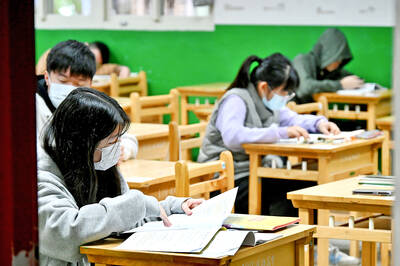
CHANGES: After-school tutoring periods, extracurricular activities during vacations or after-school study periods must not be used to teach new material, the ministry said The Ministry of Education yesterday announced new rules that would ban giving tests to most elementary and junior-high school students during morning study and afternoon rest periods. The amendments to regulations governing public education at elementary schools and junior high schools are to be implemented on Aug. 1. The revised rules stipulate that schools are forbidden to use after-school tutoring periods, extracurricular activities during summer or winter vacation or after-school study periods to teach new course material. In addition, schools would be prohibited from giving tests or exams to students in grades one to eight during morning study and afternoon break periods, the
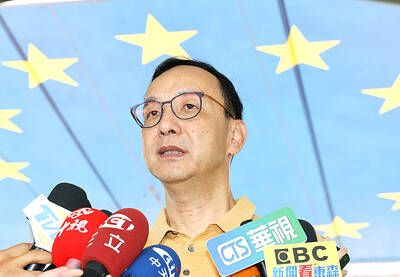
GOOD DIPLOMACY: The KMT has maintained close contact with representative offices in Taiwan and had extended an invitation to Russia as well, the KMT said The Chinese Nationalist Party (KMT) would “appropriately handle” the fallout from an invitation it had extended to Russia’s representative to Taipei to attend its international banquet last month, KMT Chairman Eric Chu (朱立倫) said yesterday. US and EU representatives in Taiwan boycotted the event, and only later agreed to attend after the KMT rescinded its invitation to the Russian representative. The KMT has maintained long-term close contact with all representative offices and embassies in Taiwan, and had extended the invitation as a practice of good diplomacy, Chu said. “Some EU countries have expressed their opinions of Russia, and the KMT respects that,” he
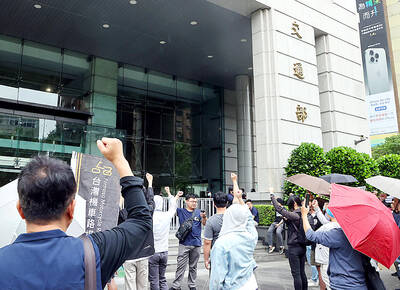
Advocates of the rights of motorcycle and scooter riders yesterday protested in front of the Ministry of Transportation and Communications in Taipei, making three demands. They were joined by 30 passenger vehicles, which surrounded the ministry to make three demands related to traffic regulations — that motorcycles and scooters above 250cc be allowed on highways, that all motorcycles and scooters be allowed on inside lanes, and that driver and rider training programs be reformed. The ministry said that it has no plans to allow motorcycles on national highways for the time being, and said that motorcycles would be allowed on the inner
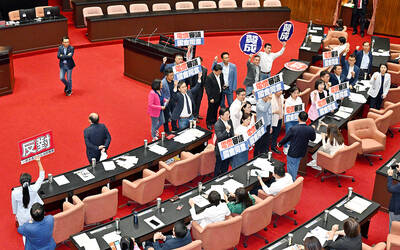
AMENDMENT: Contact with certain individuals in China, Hong Kong and Macau must be reported, and failure to comply could result in a prison sentence, the proposal stated The Chinese Nationalist Party (KMT) and the Taiwan People’s Party (TPP) yesterday voted against a proposed bill by Democratic Progressive Party (DPP) lawmakers that would require elected officials to seek approval before visiting China. DPP Legislator Puma Shen’s (沈伯洋) proposed amendments to the Act Governing Relations Between the People of the Taiwan Area and the Mainland Area (臺灣地區與大陸地區人民關係條例), stipulate that contact with certain individuals in China, Hong Kong and Macau should be reported, while failure to comply would be punishable by prison sentences of up to three years, alongside a fine of NT$10 million (US$309,041). Fifty-six voted with the TPP in opposition